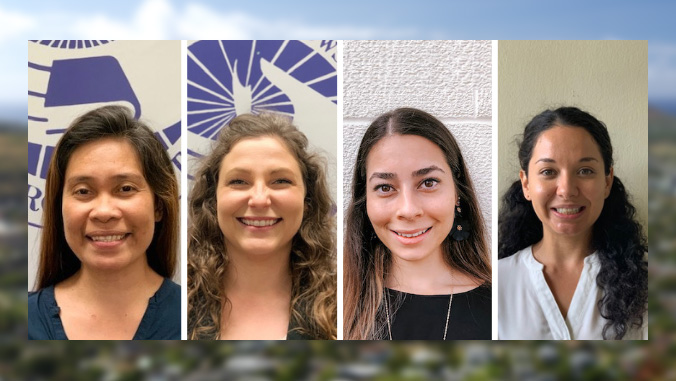
University of Hawaiʻi at Mānoa doctoral candidates, in programs ranging from linguistics to health sciences, have been selected to receive the esteemed 2020 Founder Region Fellowship from Soroptimist Founder Region Fellowship, Inc. This year, 4 of the 7 awardees in the Founder Region, which encompasses Northern California, Hawaiʻi, Guam, the Mariana Islands and the Republic of Palau, are from UH Mānoa.
Honorees Sharon Estioca, Joanna Kettlewell, Solange Saxby and Priscilla Seabourn were honored at this year’s virtual Founder Region conference held in May 2020, where they shared their research findings and each received $10,000 of unrestricted funds to cover expenses to complete their doctoral degrees. “This fellowship has allowed me to continue my education without the burden of financial stress,” said Seabourn, a doctoral candidate in entomology. “More importantly, it has enabled me to connect with other highly educated women in diverse fields of study.”
“The application materials, research and work reflected in those materials, and the candidates themselves are consistently impressive and inspiring. Indeed, over the years many of the UH Mānoa applicants have received our fellowship awards,” shared Cheryl Poncini, fellowship president of the Soroptimist Founder Region Fellowship Board of Directors. “The fellowship board and I look forward to receiving and reviewing the applications for our 2021 fellowship awards.” The deadline for submitting completed application packets is January 11, 2021.
Founded in 1921, Soroptimist is a global volunteer organization committed to promoting the empowerment of women through access to education to achieve economic empowerment and participation in decision-making at all levels in the community. The fellowship is awarded to outstanding women doctoral candidates whose area of study improves the lives of women and girls and contributes to the welfare of society.
Krystyna Aune, dean of graduate division, noted, “The Founder Region of Soroptimist International has been a generous supporter of female doctoral students at UH Mānoa. We are so grateful for our long-standing collaborations and know that the support they provide will help our graduate students continue to make significant contributions through their research.”
Founder Region Fellowship honorees
Sharon Estioca, College of Languages, Linguistics, and Literature (Linguistics)
As a native Subanon and former elementary school teacher, Estioca is working to become a documentary linguist. Estioca came to the U.S. to earn a PhD in linguistics so she could learn more about teaching and how to preserve undocumented languages. The Subanon language is an endangered Austronesian language indigenious to the Philippines. Estioca’s dissertation is a comprehensive description of the grammar of Subanon, which will be critical for teaching the language to the new generation of Subanons. Estioca is also co-compiling a Subanon-English dictionary for publication.
Joanna Kettlewell, John A. Burns School of Medicine (Biomedical Sciences, Tropical Medicine)
Kettlewell’s dissertation studied the potential impact of pharmaceutical agents to inhibit human immunodeficiency virus (HIV) entry into the brain and resulting inflammation that leads to a spectrum of cognitive deficits referred to as HIV-associated neurocognitive disorders. UH Mānoa has translated Kettlewell’s knowledge and skills in infectious disease to public health. Since graduating with her PhD, Kettlewell is now assisting the Hawaiʻi State Laboratories Division in the COVID-19 response as a postdoctoral fellow.
Solange Majewska Saxby, College of Tropical Agriculture and Human Resources (Nutritional Sciences)
Saxby is exploring the prebiotic potential of local Hawaiian foods, specifically taro, to modulate the gut microbiome and prevent colorectal cancer. The gut microbiome is a highly individualized ecosystem of microorganisms within the colon, which may influence human health. She hopes that her research can elucidate the interconnectedness of diet, the gut microbiome and overall human health.
Priscilla Seabourn, College of Tropical Agriculture and Human Resources (Entomology)
Seabourn’s dissertation studies the microbiome of a mosquito species widespread throughout Hawaiʻi that is a major vector of the Dengue and Chikungunya viruses. Seabourn’s project is essential for understanding how disease transmission changes across landscapes and aims to clarify which environmental and ecological characteristics impact the mosquito microbiome. As a result, this study may enhance the predictability of mosquito-borne disease outbreaks. Seabourn strives to cultivate a career in public health by improving lives in local and global communities.

